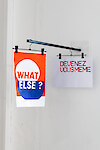














We have no art, we do everything as well as we can
In 1962, Sister Mary Corita Kent, a nun at the Convent of the Immaculate Heart of Mary in Los Angeles, went to the Ferus Gallery to see the famous show where Andy Warhol adopted silkscreen printing with his Campbell’s Soup series.
“Sister Corita”, as she was known, took holy orders at the age of 18, but she was no novice when it came to art, and the silkscreen was already her favorite medium. She took classes at the Otis College of Art and Design, and at the Couinard Art Institute, and had a PhD in art history from the University of Southern California. She then became a professor at the University of the Immaculate Heart. Yet that moment would be a decisive one, and promote her as the woman who would become the “Pop Art Nun”. As an artist, woman, teacher and nun, Corita could not be pigeonholed. Her silkscreen works showed a celebratory approach to consumer society, running counter to Pop art champions like Robert Rauschenberg, Jasper Johns and Richard Hamilton, in whose work the flaws of materialism appear in a colder light. 1962 was also the year when Pope John XXIII convened the Second Vatican Council, ushering in a great movement of openness espoused by the Church with regard to contemporary culture. In that context of emancipation, Corita appropriated the language of advertising and let color and words enjoy an explosion of freedom. Slogans, lyrics, biblical verses and authors’ quotations were all freely committed to paper in an engaged re-contextualization, indissociable from her faith, conveying values of tolerance as well as resistance to inequalities.
The works brought together at the Passerelle... [lire plus]
Dans le cadre de À Cris Ouverts – 6e édition des Ateliers de Rennes - biennale d’art contemporain
Courtesy of the Corita Art Center, Immaculate Heart Community, Los Angeles, CA
